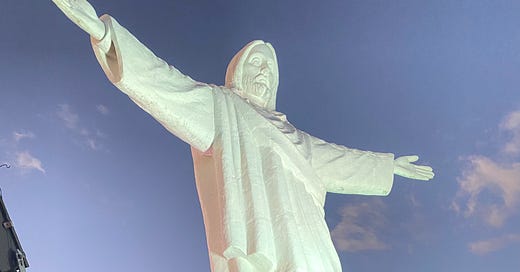In The New Age Chronicle and Good Government, the chapter regarding the miracle of God struck me as there was a surprising reliance on God. I did not grow up with Christianity or Catholicism so using the will of God as an explanation for every disaster or miracle was a concerning one. In this section of the book, Gaumon Poma recounts numerous instances in which tragedies such as natural disasters and miracles such as victory in battle are reasoned to be caused by God's divine will. While Guamon Poma’s argument may have been more convincing to readers of their time, there are inherent dangers to relying on the divine will of God as an explanation for every occurrence.
While the will of God may have provided a sense of order and comfort in a chaotic world, this reasoning can lead to complacency and a neglect of personal responsibility. A notable example in this section is how the punishment of God may come in the form of Indians dying in quicksilver and silver mines, and others dying of silver poisoning. Using the will of God to explain this tragedy absolves people from responsibility for poor and unsafe working conditions. Moreover, without looking at factors such as the working conditions and the lack of safety precautions, the problem may continue to perpetuate, and a closer investigation into preventative factors may be ignored since the cause of the phenomenon is believed to be God’s will.
I believe the divine intervention of god may also lead one to believe that they are deserving of their misfortune which is a harmful mindset to adopt. For example, it was mentioned that God may impose great snowfall and hailing storms which in some cases, kill many people and cattle. For individuals who do not subscribe to the belief that everything occurs due to God’s will, the event may simply be an unfortunate circumstance that one will have to learn and grow through, rather than being a punishment for whatever wrongdoing they may have performed. This section was intriguing to me because it demonstrates the double-edged sword that a fatalistic mindset can have. For one, it can lead one to play a more passive role in their life and neglect their responsibility. On the other edge, attributing meaning to tragic or joyous events may lead one to breed resiliency in the face of adversity as they will be focused on adapting to the situation. Similarly, fatalism can allow one to focus on finding contentment in the present moment by recognizing some events are beyond their control. However, this acceptance can easily lead one to resign to their circumstances and reject the possibility that they can change or improve.





"Similarly, fatalism can allow one to focus on finding contentment in the present moment by recognizing some events are beyond their control." You have brilliantly detected one of the most complicated theological problems for Christianity, especially for that of the 16th and 17th centuries: to what extent personal responsibility can modify divine plans. One response was pessimism, or rather Melancholy. However, in Guamán Poma I don't find it so clear. Someone else on their blog mentioned a "reformist" conception of politics in this author. Guamán Poma hopes to influence change, not radically anti-colonial, but in very practical terms for everyday life.